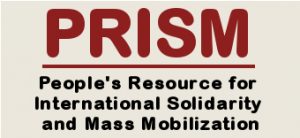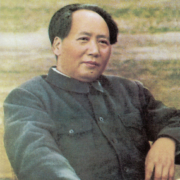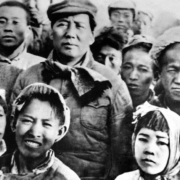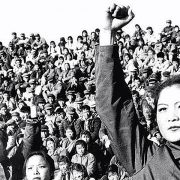Combat Liberalism
This question-and-answer session on Mao Zedong’ article, “Combat Liberalism”, is the third episode in the ongoing ND Online series on Mao for the whole of December 2020. Mao Serye is part of the continuing study program by Anakbayan-Europa through its ND Online School.
Combat Liberalism
Third Episode in Mao Series of the ND Online School of Anakbayan-Europa
Questions by Edna Becher
Answers by Jose Maria Sison
20 December 2020
1. What is the context of “Combat Liberalism”? What circumstances brought Mao the need to write this?
JMS: Mao wrote “Combat Liberalism” in 1937 in Yenan in the course of the campaign on theoretical and political education.There were conditions of truce between the Chinese Communist Party and the Guomindang after the signing of the Second United Front Against Japan in December 1936. The short article was republished in 1942 in connection with the Rectification Movement in Yenan.
It focuses on the individualistic conduct and selfish behavior of some Party members who run afoul of the collective and the principle of democratic centralism. The social basis of this unhealthy phenomenon within the Communist Party is the petty bourgeoisie. Certain members join the Party but continue to carry with them petty bourgeois “tails” and need further remoulding as proletarian revolutionaries.
Some commentators expect a critique of the liberal philosophy. But in very concrete terms Mao hits the mark by criticizing individualism which is the core of petty bourgeois ideology of various types. Thus, the article is disliked or even condemned by liberals, anarchists, Trotskyites and other individualist and subjectivist trends that oppose collectivity, democratic centralism and the mass line in the revolutionary struggle.
2. Liberalism may have different meanings to some people. Can you clear up what liberalism is that which Mao is tackling in this pamphlet? What is meant by that liberalism which rejects ideological struggle?
JMS: Mao discusses as many as eleven manifestations of liberalism which include the following:
- 1. To let things slide for the sake of peace and friendship, when a person has clearly gone wrong; to refrain from argument because he is an old acquaintance…
- 2. To indulge in irresponsible criticism in private instead of actively putting forward one’s suggestions to the organization. To say nothing to people to their faces but to gossip behind their backs…
- 3. To let things drift if they do not affect one personally; to say as little as possible while knowing perfectly well what is wrong, to be worldly wise and play safe and seek only to avoid blame.
- 4. Not to obey orders but to give pride of place to one’s own opinion. To demand special consideration from the organization but to reject its discipline.
- 5. To indulge in personal attacks, pick quarrels, vent personal spite or seek revenge instead of entering into an argument and struggling against incorrect views for the sake of unity or progress…
- 6. To hear incorrect views without rebutting them and to hear counter-revolutionary remarks without reporting them, but instead to take them calmly as if nothing had happened.
- 7. To be among the masses and fail to conduct propaganda and agitation or speak at meetings… Forgetting that one is a Communist and behaving as if one is an ordinary non-Communist.
- 8. To see someone harming the interests of the masses and yet not feel indignant or dissuade or stop him but allow him to continue.
- 9. To work half-heartedly without a definite plan or direction; to work perfunctorily and muddle along…
- 10. To regard oneself as having rendered great service to the revolution, to pride oneself on being a veteran [yet] to be slipshod in work and slack in study.
- 11. To be aware of one’s own mistakes and yet make no attempt to correct them, taking a liberal attitude towards oneself.
As Mao has correctly pointed out, all the foregoing acts of liberalism within the Party express or manifest the rejection of ideological struggle. And I wish to add that those who practice liberalism actually peddle their own petty bourgeois ideology and try to obscure their own need for Marxist education. They are not humble enough to acknowledge their need for further Marxist education if they are indeed sworn to develop themselves as Party members.
At one point in the article, Mao refers to some Party members who think that they can adhere to liberalism and Marxism at the same time.They presume that they can flip from one to the other or even mix them up. There are such eclectics who even presume that they are smarter than others because of their eclecticism. But it is not really possible to be a consistent, systematic and profound Marxist by not discarding and combatting liberalism.
3. Liberalism manifests itself in various ways. One example is to let things slide for the sake of peace and friendship when a person has clearly gone wrong, and refrain from principled argument because of personal relationships. This is particularly difficult in practice. There are comrades who do criticize and argue every wrong point. In organizing, it is tricky to point out every wrong view and opinion of the masses immediately, because we don’t want them to distance themselves in the start. How do we balance this and how do we weigh which is liberalism and which is not?
JMS: I do not agree that there is any wrong idea or any wrong factual claim from comrades and the masses that cannot be answered and explained in a respectful, friendly and persuasive way. In the first place, we propagate the line that in the revolutionary movement we learn from each other. It is wrong to let a wrong idea stand or pass just to avoid offending the one who expressed it.
The Marxist knows how to answer or explain how wrong an idea or claim is in a reasonable and persuasive way without insulting or running down the other side in the discussion. I have had so many students who even express rabid anti-communist ideas. But they have been intelligent enough to learn from what I explain. Sometimes, even the apparently most rabid anticommunist becomes eventually an activist or even a comrade and devoted student of Marxism.
4. Mao talks about irresponsible criticism. What does he mean by that? In our organizations, what are methods we use to conduct responsible criticisms?
JMS: Even among those who are already presumed to know the decisive importance and necessity of democratic centralism and collectivity in Party life, there are some members who act and speak liberally or individualistically by making irresponsible criticisms at the expense of comrades who are absent or at the expense of decisions taken by collective organs and units of work.
Those who come across such irresponsible comrades should admonish them immediately to bring the criticism before the proper organ or collective.They should also be reported accordingly. Thus, the criticism is looked into before any disunity arises that obscures the issue if there is any serious one that exists.
5. Not to obey orders but to give pride of place to one’s own opinions. To demand special consideration from the organization but to reject its discipline. This is also a form of liberalism. What do we do in cases that we do not agree with the orders given from us? How do we ensure democracy in our organization?
JMS: When a lower organ or a lower collective does not agree with an order from above, it must send up promptly the reasons and facts why the order is wrong and should be corrected immediately. It is wrong for any individual or even a lower organ or organization of the Party swell-headed and break discipline.
There is a dialectical and interactive relationship between higher and lower levels of organs and organizations.The higher level is ever appreciative of timely and more accurate reports, recommendations, criticisms and new proposals. It shuns bureaucratic centralism and commandism. The communist principle and style is to work through the collective and follow democratic centralism.
6. To be among the masses and fail to conduct propaganda and agitation or speak at meetings. This is also a form of liberalism. Can you elaborate on this and give examples?
JMS: Every time a communist is among the masses, he must avail of the opportunity to conduct propaganda and agitation. There are always burning issues to take up. And there is always the need to raise the level of revolutionary consciousness and militancy among the masses. To waste the opportunity is to fail to perform a duty. It is a form of liberalism, a way of taking it easy and neglecting to carry out a task.
7. What does the saying “So long as one remains a monk, one goes on tolling the bell.” mean and why is that harmful to our organization?
JMS: This means doing the routine all by oneself and not taking a new initiative with other comrades in order to raise the level of revolutionary work to a new and higher level. Being daily satisfied with the status quo and doing the same chores day in and day out run counter to the constant need for arousing, organizing and mobilizing more people for the strengthening and advance of the revolutionary movement.
8. To regard oneself as having rendered great service to the revolution, to pride oneself on being a veteran, to disdain minor assignments while being quite unequal to major tasks, to be slipshod in work and slack in study. This is liberalism. How do we ensure that comrades don’t fall to this kind of liberalism?
JMS: This is a case of liberalism in which someone thinks so highly of himself that he would disdain to do anything below his imagined self-importance even as he is actually short of what he can accomplish or does slipshod work and is wanting in further education. Such comrades who overrate themselves and underperform should come under the supervision and direction of the appropriate organs and collectives as well as of the masses.
9. Mao named eleven principal manifestations of liberalism in his pamphlet, and mentions there are more. We recommend that listeners read the whole text. Ka Joma, can you explain where liberalism stems from.
JMS: Mao declares, “Liberalism stems from petty-bourgeois selfishness, it places personal interests first and the interests of the revolution second, and this gives rise to ideological, political and organizational liberalism . . . Liberalism is a manifestation of opportunism and conflicts fundamentally with Marxism. It is negative and objectively has the effect of helping the enemy; that is why the enemy welcomes its preservation in our midst. Such being its nature, there should be no place for it in the ranks of the revolution.”
10. To conclude, can you elaborate why liberalism is extremely harmful to the revolutionary collective and how can we battle and overcome it?
JMS: Mao teaches us:
Liberalism is extremely harmful in a revolutionary collective. It is a corrosive which eats away unity, undermines cohesion, causes apathy and creates dissension. It robs the revolutionary ranks of organization and strict discipline, prevents policies from being carried through and alienates the Party organizations from the masses the Party leads. It is an extremely bad tendency…
We must use Marxism, which is positive in spirit, to overcome liberalism, which is negative… All loyal, honest, active and upright Communists must unite to oppose the liberal tendencies shown by certain people among us and set them on the right path. This is one of the tasks on our ideological front.
We can combat and overcome liberalism by studying Mao’s “Combat Liberalism”, raising our level of consciousness about it and being vigilantly and militantly critical of it every time that it is manifested. Mao prescribes the following: “We stand for active ideological struggle because it is the weapon for ensuring unity within the Party… But liberalism rejects ideological struggle and stands for unprincipled peace, thus giving rise to a decadent attitude and bringing about political degeneration in certain Party individuals and revolutionary organizations.”
###






Leave a Reply
Want to join the discussion?Feel free to contribute!